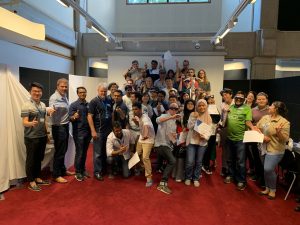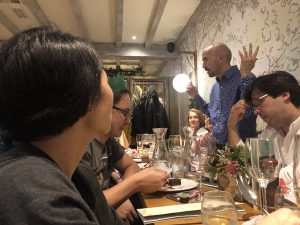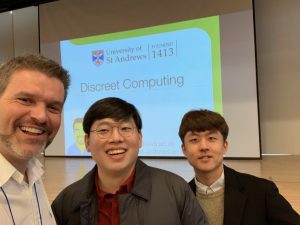
SACHI’s Iain Carson has led a team to cinematographic success at this year’s 60 Hour Film Blitz, a competition run by the School of Film Studies where participants have to make a film within a 60 hour timeframe. Alongside Iain, Fionnghuala Paterson, Zac Chave-Cox and Arthur Bassas, made up the “Salted Feathers”, and swept up 4 of the 9 available gala awards with their 3-minute short, “SALT”.
MORE
News
Event details
- When: 2nd April 2019 14:00 – 15:00
- Where: Cole 1.33a
- Series: School Seminar Series
- Format: Seminar
Abstract:
Escape rooms are popular recreational activities whereby players are locked in a room and must solve a series of puzzles in order to ‘escape’. Recent years have seen a large expansion technology being used in these rooms in order to provide ever changing and increasingly immersive experiences. This technology could be used to minimise accessibility issues for users, e.g. with hearing or visual impairments, so that they can engage in the same way as their peers without disabilities. Escape room designers and players completed an online questionnaire exploring the use of technology and the accessibility of escape rooms. Results show that accessibility remains a key challenge in the design and implementation of escape rooms, despite the inclusion of technology that could be used to improve the experience of users with disabilities. This presentation will explore the lack of accessibility within Escape Rooms and the potential for technology to bridge this gap.
Speaker Bio:
Dr Rachel Menzies is the Head of Undergraduate Studies for Computing at the University of Dundee and is the current SICSA Director of Education (https://www.sicsa.ac.uk/education/). She co-directs the UX’d research group (https://www.ux-d.co.uk/) and her research interests include user centred design with marginalised user groups, such as users with disabilities, as well as exploring novel interfaces, data visualisation and CS education. Her most recent work focusses on accessibility is in escape rooms, in particular how users with varied disabilities can access and enjoy the experience alongside typical users.
Event details
- When: 2nd April 2019 14:00 - 15:00
The Faculty of Mathematics, Natural Sciences and Information Technologies at the University of Primorska (UP FAMNIT) is offering one fully-unded PhD scholarship for a planned Joint PhD (co-tutelle) in computer science with University of St Andrews (UK).
The selected candidate will receive a 36-48 month scholarship which includes:
- Monthly payments of 1,544 € before tax + expenses
- Research equipment and a working desk.
- Yearly budget for other research costs for covering fieldwork and conference attendance.
- Tuition fees at University of Primorska.
NOTE: St. Andrews tuition fees are not covered by this scholarship. For possible exemptions and height of tuition fees visit follow this link. Fees need to be paid during the time at St. Andrews (minimum one year). MORE
 As an ACM Distinguished Speaker, Professor Quigley was recently invited to deliver a series of lectures in New Zealand on “Novel Interactions in Augmented Reality” and “Discreet Computing” at the “Magic Leap Workshop” (a.k.a. Augmented Reality Summer School February 11th – 15th, 2019 in Auckland, New Zealand). To thank the summer school participants, SACHI sponsored a prize (from the Weta Workshop), which Aaron gave to three teams at the AR Summer School.
As an ACM Distinguished Speaker, Professor Quigley was recently invited to deliver a series of lectures in New Zealand on “Novel Interactions in Augmented Reality” and “Discreet Computing” at the “Magic Leap Workshop” (a.k.a. Augmented Reality Summer School February 11th – 15th, 2019 in Auckland, New Zealand). To thank the summer school participants, SACHI sponsored a prize (from the Weta Workshop), which Aaron gave to three teams at the AR Summer School.
MORE
The St Andrews Computer Human Interaction research group (SACHI) was established in 2011. Each year our members have been involved in summer or winter schools, either as organisers or participants. Starting from 2011 we organised, with our colleagues across Scotland, the SICSA Multimodal Systems for Digital Tourism summer school here in St Andrews. In 2012, Professor Quigley taught a summer school in Oulu Finland “UbiOulu” on UbiComp and Big Data. In early 2013, Dr. Anne-Marie Mann attended the “Tiree Tech Wave” and later that year we organised another school here in St Andrews called the SICSA summer school on Big Data, Information Visualisation with Professor Adam Barker the director of the Systems Research Group. SICSA further supported this event with a distinguished visiting fellowship for Professor John Stasko, of Georgia Tech, who is now a visiting Professor here in St Andrews.
MORE
On February 1st, Professor Quigley delivered an invited talk as part of the ACM Distinguished Speaker Program during the HCI@KAIST International Workshop in KAIST, Daejeon, South Korea.
MORE
 Professor Aaron Quigley is currently in Singapore on sabbatical with the CUTE centre. His welcome seminar was on the topic of Discreet Computing and showcased a number of SACHI projects.
Professor Aaron Quigley is currently in Singapore on sabbatical with the CUTE centre. His welcome seminar was on the topic of Discreet Computing and showcased a number of SACHI projects.
MORE
The SICSA HCI theme has an annual all hands meeting and in 2019, the St Andrews Computer Human Interaction research group (SACHI) is organising and hosting this event in St Andrews today.
This year we took the opportunity to create a unique event where we invited all the subcommittee chairs of the ACM Conference on Human Factors in Computing Systems (CHI) to join us and present an introduction to their research. Today twenty of these chairs will join nearly 100 HCI researchers from across Scotland. We will have presentations from our visitors from around the world and from across SICSA.

 MORE
MORE

Title: What would you do if you could touch your data?
Abstract: Data Physicalizations are physical artefacts whose geometry or material properties encode data. They bring digital datasets previously locked behind 2D computer screens out into the physical world, enabling exploration, manipulation, and understanding using our rich tactile senses. My work explores the design and construction of dynamic data physicalizations, where users can interact with physical datasets that dynamically update. I will describe our data physicalization vision and show our progress on designing, building, and evaluating physicalizations and discuss the many exciting challenges faced by this emerging field.
Speaker biography: Jason is a Senior Lecturer in the School of Computing and Communications at Lancaster University. He has a BSc(Hons) and PhD in Computer Science from the University of Canterbury in New Zealand and was previously a post-doctoral researcher at the University of Bristol. His research is broadly in Human-Computer Interaction, with a particular interest in developing novel interactive systems to bridge the physical-digital divide. His recent work focuses on the development of shape-changing interfaces—surfaces that can dynamically change their geometry based on digital content—and their application to data physicalization. He also has interests in digital fabrication and novel haptic interaction techniques.
Event details
- When: 29th November 2018 14:00 - 15:00
- Where: Cole 1.33a

Title: The story of Swarachakra – Cracking the puzzle of text input in Indian languages
Abstract: There was a time when text input in Indian languages was called a ‘puzzle’. People found it so difficult that became a barrier that prevented them from using most other technology products, from doing common tasks such as searching the web or saving a contact. As a result, Indians typed very little in their own languages. The Roman script (in which we write English) is an Alphabet. In contrast, a large majority of Indian scripts are Abugidas – a different type of scripts. In our lab, we were convinced that we need different solutions – what works for Alphabets may not work for Abugidas. Over the years we explored several designs. Our early solutions were for desktop computers. Later we developed concepts for the feature phones. We tried several creative ideas and made prototypes. We got interesting results in the lab. We published papers and case studies. But beyond that, we could not reach out and make a difference to the end-users. Then smartphones arrived, and quickly became popular. It became relatively easier to develop and deploy keyboards. Again, we tried several ideas. One solution stood out in comparison with others. We called it “Swarachakra”. Today, Swarachakra is available for 12 Indian languages and has been downloaded by about 4 million users. What was the problem, and how was it solved? And what challenges remain? Come to the talk to find out.
Speaker biography: Anirudha Joshi is professor in the interaction design stream in the IDC School of Design, IIT Bombay, India, though currently he is on a sabbatical, visiting universities in the UK. His specialises in design of interactive products for emergent users in developing economies. He has worked in diverse domains including healthcare, literacy, Indian language text input, banking, education, industrial equipment, and FMCG packaging. Anirudha also works in the area of integrating HCI activities with software engineering processes. He has developed process models, tools, and metrics to help HCI practitioners deliver a better user experience. Anirudha is active with HCI communities in India and outside. He has chaired in various roles in several conferences including India HCI, INTERACT and CHI. Since 2007, he represents India on IFIP TC13. He is the founding director of HCI Professionals Association of India since 2013. Since 2015 he is the Liaison for India for the ACM SIGCHI Asian Development Committee. Since 2016, he has been the VP Finance of the ACM SIGCHI Executive Committee. Anirudha has diverse backgrounds. He is a BTech (1989) in Electrical Engineering, an MDes (1992), in Visual Communication Design, and a PhD (2011) in Computer Science and Engineering, all from IIT Bombay.
Event details
- When: 29th October 2018 15:00 - 16:00
- Where: Cole 1.33a



